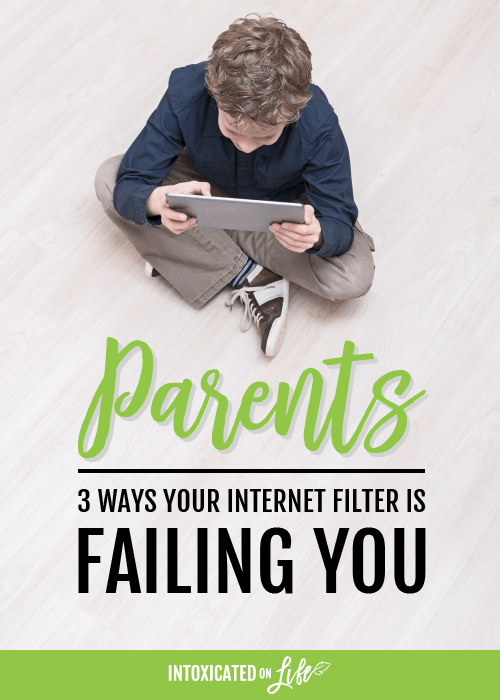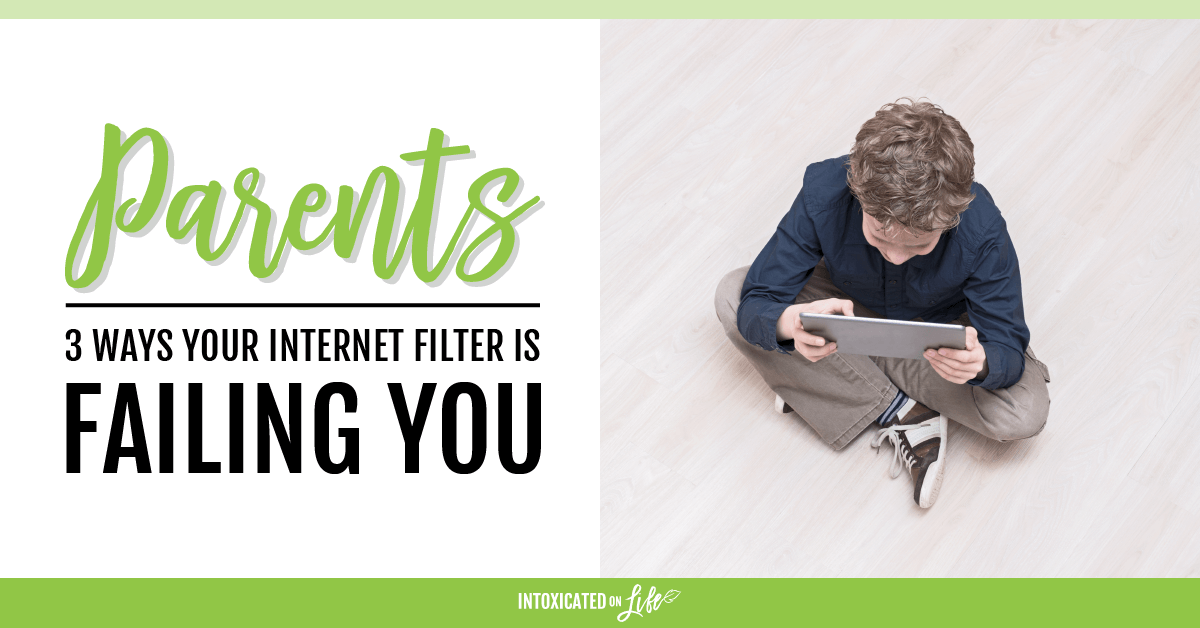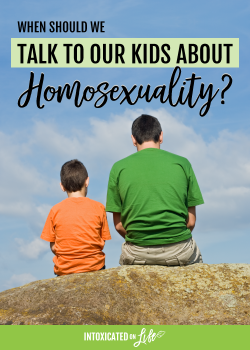Can I be frank for a moment? I know the next sentence may make you uncomfortable…
I used to watch porn. A lot.
I lament thinking about what my life would have been like had I discovered porn any earlier than I did. The habit caused me plenty of grief and was one of the reasons why it was so difficult for me to form relationships.

I’m not alone—far from it. Among Christian men in my generation, 57% of us still watch porn once a month or more. Ouch. For younger generations of Christian men, that percentage is much higher—over three quarters of them. For Christian women, it’s around 15% that are watching once a month or more.1
Most of these people first saw porn and developed their habit while they were still under their parent’s roofs. Is this the kind of sex education we want for our kids?
Your Internet Filter is Not Enough
Most Christians parents I know at least think they have some protection in place on their devices. This is a good start, but knowing the power of porn personally, I simply won’t settle for just an Internet filter in my home. Even a really good one.
1. Filters can provoke more temptation.
Put up a fence and the natural human tendency is to want to look over it. Some of it is just curiosity. But some of it is also sinful rebellion: we want what we aren’t allowed to have (Romans 7:7-8).
Internet filters work a lot like that. When they function correctly, they provide great protection against accidental exposures. It doesn’t take long for a child to want to know what is beyond the fence.
Perhaps the fence will keep them out for a while, but it won’t take long for them to find a way around it:
- They’ll use a computer at a friend’s house.
- They’ll find a relative’s smartphone.
- They’ll discover one day you forgot to log out of your administrator profile.
- They’ll just test the fence until they find a weak spot.
You might be thinking, “Not my kid!” Personally, I believe too strongly in the deceptive power of human sin to say that about my kids.
But let’s assume you’re right—you really do have a good kid who wouldn’t look for porn if he had a gun to his head. Kudos to you. But even if your child isn’t looking for porn, porn is looking for your child.
We can’t trust the purveyors of porn to play by the rules online.
2. Filters aren’t relational or conversational.
When your child runs in to a fence, no one knows except your child and the fence—unless you happen to be looking at the right moment.
Dr. Patricia Greenfield, Professor of Psychology at UCLA, directs Children’s Digital Media Center which researches the developmental implications of the Internet. After decades of research, here is her advice to parents:
“A warm and communicative parent-child relationship is the most important nontechnical means that parents can use to deal with the challenges of the sexualized media environment.”2
Ultimately, Internet filters aren’t tools that facilitate good conversation.
It isn’t enough to merely stop kids from seeing something bad online. Parents should know what their kids are searching for, what they’re clicking on, and where their searches are leading them.
Parents should make conversations about the Internet a habit around the home, so that they can teach children to enjoy the Internet responsibly, and so little problems can be dealt with before they become big problems.
3. Filters don’t prepare kids for a world without filters.
The ultimate goal of our parenting is not to raise children but to raise adults. Before you know it, your 5-year-old will be 10, then 15, then 25.
Will you prepare them for a pornified world?
Internet filters are like training wheels—and kids will likely need these training wheels for while. Unlike riding a bike, the road of the Internet is far less predictable. But eventually, if you want your kids to be able to explore all the good things the Internet has to offer, the wheels need to come off—gradually.
Liz Perle, editor in chief of Commonsense Media, says the secret to stopping porn from getting to your kid is training: “What you need to do is not cover your kids’ eyes but teach them to see. Install that software in their heads.”3
What our kids need more than an Internet filter is an “internal filter.”
We need to teach our sons and daughter how to see our sexualized world with the eyes of Jesus Christ, how to respond to over-sexualized images when they are thrust in their faces, and how to respond to sexual temptations when they come on strong.
Better Than Internet Filtering: Accountability
The good news is that as you rely less on filtering alone, you can rely something else that overcomes these limitations. Use Internet accountability software. We use Covenant Eyes in our home, and we love it.
Internet accountability software doesn’t block websites, it monitors, rates, and reports on the websites that are visited. I can get an Internet report for each of my kids every week. I love it because…
- Paired with Covenant Eyes filtering, it gives our kids maximum protection.
- It is relational: I can have conversations about what I see on my sons’ reports.
- It gives my kids freedom in the context of responsibility.
- It grows with my kids. Accountability is good for adults and kids alike, so I’m giving them a tool they can use into adulthood.
- It holds me accountable, not just my kids (my mentor at church gets my Internet accountability reports).











Well, I would probably want to use this in conjunction with filtering (there are some things you can’t unsee!) but yes, this sounds awesome!
We use both the Filtering and the Accountability and we love it.
We currently have Net Nanny and we all hate it. However, I have stumbled across some really disgusting stuff completely by accident. And my son like to play games. The ads on those sites are often pretty provocative. Is the filtering with Covenant Eyes any better? It just seems that Net Nanny constantly blocks things that are completely fine. Maybe it’s just the nature of the beast.
To clarify, Net Nanny does work to protect us from stumbling onto things. That was on an unfiltered device.
Some of it is the nature of the beast, but I encourage you to try Covenant Eyes to see if it works better for you. Is does rate every part of every page separately and blocks those parts accordingly.
This is timely. I just found out my 8yo son got a tablet from his dad for Christmas. He, my son, was telling me that he has free access to Netflix and the Internet. I’m very worried, but there’s nothing I can do except to keep talking with him. Any specific advice on what kinds of conversations to have?
First, you can see if Covenant Eyes works on it. It has app locking, which means you can lock down your Netflix app and even the browsers.
In general, at 8 years old, it is best he have some protections in place in order to prevent accidental exposures, but it is also best that he have a clear understanding of your expectations. If you are monitoring the device (with something like Covenant Eyes) you can keep an eye out for small problems before they become big problems.
As far as talking to him about pornography, you might enjoy this article or this one I wrote for Covenant Eyes.
I have a linux operating system. Will covenant eyes work with it?
I also have three children (2 boys, 1girl) who are all in their teens or preteens now. Each has been exposed to porn at some point through internet use. My husband and I have had rules in place and have talked to our kids about the dangers of porn. Unfortunately, the porn industry is more sinister than I care to imagine and target children in every way possible. The older son and the daughter seem to not be drawn by the temptation as much as the younger son. This son has OCD that exists in a cohabiting relationship with Tourette’s Syndrome. His exposure to porn (even though a once or twice exposure) has done unimaginable damage and is causing the family much stress and heartache. With an obsessive tendency, he is constantly fighting temptation. I am working with him on scripture memorization to fight temptation, but I feel like I am failing miserably. Do you have any advice for my husband and me as we try to help him through this?
Covenant Eyes will not work on Linux, no. But this article on Tech Radar has some reviews of good Linux filters.
In the cast with your youngest son—as is the case with anyone with a demonstrative problem—it is best to do whatever it takes to remove all access to pornography. If it were my son, I would have very stringent restrictions concerning when and how he was able to get online. That is a good first step.
Assuming he can’t access porn anymore, how else is the temptation presenting itself? What does he struggle with specifically? Lust induced masturbation? Sexual fantasies?
First, I am not Christian, one day I was. I am a partner of a guy who had a porn addiction. When we started going out, he told me in the second/third time that he used porn. When we started dating I realized he was in fact addicted to it to the point he struggled his whole adult life with PIED and never managed to have a relationship.
At first I thought he would eventually drop it off his life as in my opinion, why would he use porn if he had a real life woman now? I was wrong. And as time passed, it really affected me. In fact, the experience was devastating. I really wish that I had walked away from the relationship at that date. But as life went on, the relationship grew and there was positive sides to it and I just carried it on. I don’t regret staying. But I regret not going. He agreed to quit it when I told him it was not ok with me. I was the first person ever to say anything against porn to him. Until that day he thought porn was totally cool and fine. As any additions, he had a significant fall. I felt so betrayed, taken as a fool and cheated. He than agreed once again to leave it behind him. We put filters on his phone. We took filters off. So far, he had a couple of bumps on the road (that I know). So far, I “believe” he hasn’t searched for it for about 6 months. There is a SafeSearch filter on his phone. I don’t think he knows about it, or how to turn it off, although it is ridiculously easy. No criticism here, I find it interesting that all filters out there, has the name parental control, protect your children and etc. It is never about an adult who needs it. I struggle with trust again. And I am from time to time checking. We live together and have a baby now. I still question myself if I will ever heal. I don’t know why I feel so heartbroken. Sorry about the long text.
That’s one of the best parts about Covenant Eyes accountability. It is used largely by adults.